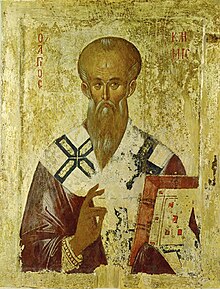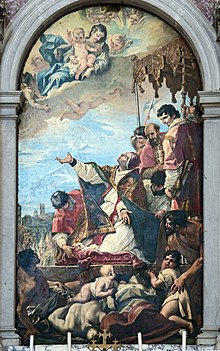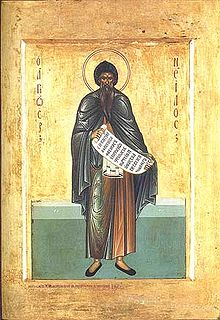Christian socialism
Appearance




Christian socialism is a form of religious socialism based on the teachings of Jesus of Nazareth. Many Christian socialists believe capitalism to be idolatrous and rooted in greed, which some Christian denominations consider a mortal sin.
Quotes
[edit]
- You, the rich, how far will you push your frenzied greed? . . . When giving to the poor, you are not giving him what is yours; rather, you are paying him back what is his. Indeed, what is common to all, and has been given to all to make use of, you have usurped for yourself alone. The earth belongs to all, and not only to the rich . . . You are paying him back, therefore, your debt; you are not giving gratuitously what you do not owe.
- Ambrose of Milan, Sermon on Naboth
- Not to share one’s wealth with the poor is to steal from them and to take away their livelihood. It is not our own good, which we hold, but theirs.
- John Chrysostom, On Lazarus and the Rich Man, II.6
- All possessions are by nature unrighteous when a man possesses them for personal advantage as being entirely his own, and does not bring them into the common stock for those in need.
- Clement of Alexandria, The Rich Man's Salvation, p. 337
- Every rich person is either a thief or the heir of a thief.
- Jerome, Homilies on Jeremiah, II.2
- What are then, tell me, the goods that you claim to possess? To what extent are they an essential part of your life? The problem with the rich is that they are like the man who takes a seat in a theatre, and then denies entrance to others, usurping thereby, and appropriating for himself what is meant for common use. The rich regard as their own those goods that they have acquired before the others, for the sole reason of having been the first to acquire them. If each one of us took only what is necessary for his sustenance, leaving what is superfluous for the indigent, there would be no distinction of rich and poor. You have become an exploiter by appropriating for yourself the goods that you were called to administer. The bread that you keep for yourself belongs to the hungry; to the naked belong the clothes that you hoard in your closet; to the barefooted belongs the shoes that is gathering moth in your home; the indigent have a right to the money you hide in your coffers.
- Basil the Great, On Avarice, on the text of Luke: "Destroy this house and I will build a large one." (Luke 12:16:21)
- Jesus was the first socialist, the first to seek a better life for mankind.
- Mikhail Gorbachev, as quoted in Daily Telegraph (16 June 1992)
- In vain do they think themselves innocent who appropriate to their own use alone those goods which God gave in common; by not giving to others that which they themselves receive, they become homicides and murderers, inasmuch as in keeping for themselves those things which would alleviate the sufferings of the poor, we may say that every day they cause the death of as many persons as they might have fed and did not. When, therefore, we offer the means of living to the indigent, we do not give them anything of ours, but that which of right belongs to them. It is less a work of mercy which we perform than the payment of a debt.
- Gregory the Great, quoted in George D. Herron, Between Caesar and Jesus (1899), pp. 111-112.
- Almost without exception, the early Christian Fathers whose teachings have come down to us spoke out fearlessly against usury, which includes interest also, and on the side of Communism. They proclaimed that, inasmuch as nature had provided all things in common, it was sinful robbery for one man to own more than another, especially if that other was in want. The man who gathered much whilst others had not enough, was a murderer.
- Keir Hardie, From Serfdom to Socialism (1907), p. 39
- Call it democracy, or call it democratic socialism, but there must be a better distribution of wealth within this country for all God’s children.
- Martin Luther King Jr., Speech to the Negro American Labor Council (May 1965), as quoted in From Civil Rights to Human Rights : Martin Luther King, Jr., and the Struggle for Economic Justice (2009), by Thomas F. Jackson, p. 230
- All the believers were together and had everything in common.
- All the believers were one in heart and mind. No one claimed that any of their possessions was their own, but they shared everything they had.
- Nothing is easier than to give Christian asceticism a Socialist tinge. Has not Christianity declaimed against private property, against marriage, against the State? Has it not preached in the place of these, charity and poverty, celibacy and mortification of the flesh, monastic life and Mother Church? Christian Socialism is but the holy water with which the priest consecrates the heart-burnings of the aristocrat.
- Karl Marx, The Manifesto of the Communist Party (1848).
- The league at Allstedt wanted to establish this principle, Omnia sunt communia, ‘All property should be held in common’ and should be distributed to each according to his needs, as the occasion required. Any prince, count, or lord who did not want to do this, after first being warned about it, should be beheaded or hanged.
- Thomas Müntzer, in Revelation and Revolution: Basic Writings of Thomas Müntzer (1993), p. 200
- The stinking puddle from which usury, thievery and robbery arises is our lords and princes. They make all creatures their property—the fish in the water, the birds in the air, the plant in the earth must all be theirs. Then they proclaim God's commandments among the poor and say, "You shall not steal." They oppress everyone, the poor peasant, the craftsman are skinned and scraped.
- Thomas Müntzer, Letter to the Princes, as cited in Transforming Faith Communities: A Comparative Study of Radical Christianity, p. 173
- The apostles ... did not seek excessive gain by exploiting each other. ... One was not rich while another was destitute, nor did one overeat while another starved. The generosity of those who were well off made good what others lacked, this willingness to share eliminating every anomaly and establishing equality and fairness. ... Inequality still existed, produced not as it is now by the mad struggle for social status, but by a great desire to live more humbly than others. Envy, malice, arrogance and haughtiness were banished, along with all that leads to discord.
- Saint Neilos the Ascetic, Ascetic Discourse, in Philokalia, as translated and edited by G. E. H. Palmer, Philip Sherrard and Kallistos Ware (1979)
- The doctrines held by the early Fathers of the Church on the nature of property are perfectly uniform. They almost all admit that wealth is the fruit of usurpation, and, considering the rich man as holding the patrimony of the poor, maintain that riches should only serve to relieve the indigent; to refuse to assist the poor is, consequently, worse than to rob the rich. According to the fathers, all was in common in the beginning: the distinctions mine and thine, in other words, individual property, came with the spirit of evil.
- Francesco Saverio Nitti, Catholic Socialism (1895) pp. 65-66
- For Paul, the whole enterprise [of the Jerusalem collection exhorted at 2 Cor 8:13-14] was rooted in the conviction that the advent of the eschatological kingdom of God had inaugurated a new socio-economic order, which was to become distinctive of the emergent Christ-believing communities on a global scale. The Jerusalem collection was thus the practical expression of κοινωνία across sociocultural and ethnic boundaries. It was the manifestation of a persistent concern for socio-economic equality and solidarity within the Christ-centred ekklēsia.
- Julien M. Ogereau, “The Jerusalem Collection as Κοινωνία: Paul’s Global Politics of Socio-Economic Equality and Solidarity,” New Testament Studies 58 (2012)
- It is correctly asserted that the apostles undertook no social propaganda. Paul held no antislavery meetings, and Peter made no public protest against the organized grafting in the Roman system of tax-farming. Of course they did not. Even the most ardent Christian socialist of our day would have stepped softly if he had been in their place. The right of public agitation was very limited in the Roman Empire. Any attempt to arouse the people against the oppression of the government or the special privileges of the possessing classes, would have been choked off with relentless promptness. If, for instance, any one had been known to sow discontent among the vast and ever threatening slave population, — which was not negro, but white, — he would have had short shrift. Society was tensely alert against any possible slave rising. If a slave killed his master, the law provided that every slave of that household should be killed, even if there was no trace of complicity. Upper-class philosophers might permit themselves very noble and liberal sentiments only because there was no connection between them and the masses, and their sentiments ended in perfumed smoke.
- Under such circumstances any prudent man will husband his chances of life and usefulness, and drop the seeds of truth warily. If the convictions of William Lloyd Garrison had burned in Paul, we should probably not know that Paul had ever existed. There is no parallel between such a situation and our own in a country where we are ourselves the citizen kings, and where the right of moral agitation is almost unlimited.
- Walter Rauschenbusch, Christianity and the Social Crisis (1913), p. 152
- Jesus was a communist
Jesus was a pacifist
Jesus was a communist
Jesus didn't like the rich- Reagan Youth, "Jesus was a Communist" (1980)
- Mary knows that within her a child is gestating. For she thereupon composed a song. It is the greatest song in history. This "Magnificat" is the battle-hymn of democracy. Sensing a child within her, Mary feels herself equal to the Roman Empire; and she announces that the days of despotism are numbered. Caesar on his seven-hilled throne may sacrilegiously style himself Augustus, "the divine one." But Mary as confidently disallows him that title. Heaven is not on the side of privilege and oppression, she affirms, but is rather on the side of the trodden. Rome is great, but Galilee with God is greater. In this song three classes of people are objects of Our Lady's invective — "the proud," "the mighty," and "the rich." And she passes upon them a threefold sentence: they are to be "scattered," "put down from their seats," and "sent empty away."
- Bouck White, The Call of the Carpenter (1914), p. 22
See also
[edit]- Christian anarchism
- Liberation theology
- Religious views on capitalism
- Social Gospel
- List of Christian socialists

